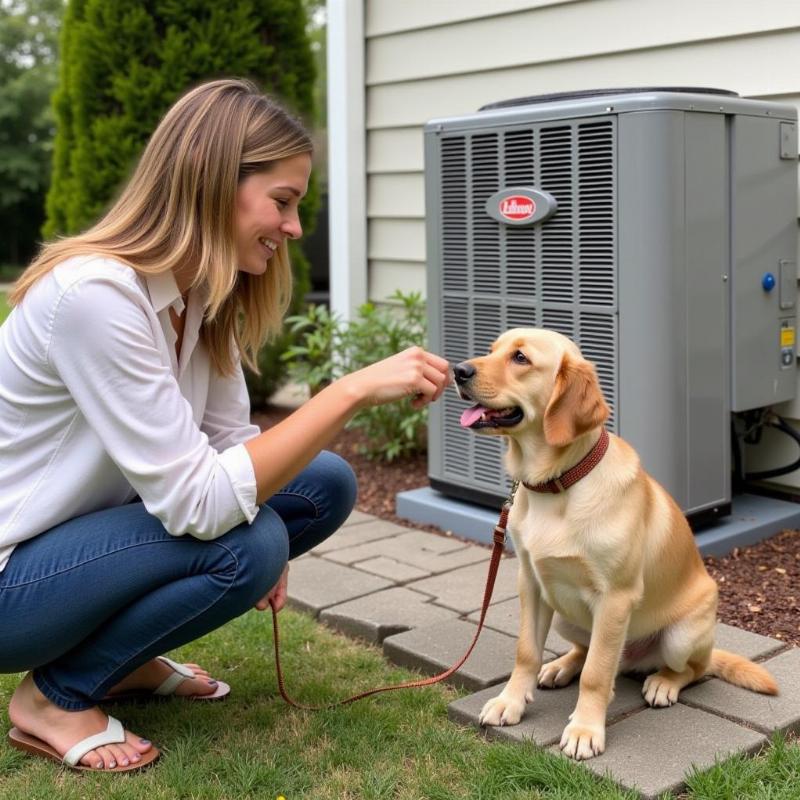Dog owners often encounter puzzling behaviors, and one of the more peculiar ones is a dog’s insistence on peeing on the air conditioner unit. This can be frustrating, unsanitary, and potentially damaging to your AC unit. Understanding the motivations behind this behavior is the first step towards resolving it. This article will delve into the reasons why your dog might be targeting your AC unit and offer practical, effective solutions for American dog owners.
Why is My Dog Peeing on the AC Unit?
Several factors can contribute to this behavior. Territorial marking is a common culprit. Dogs use urine to communicate, leaving their scent on objects they consider part of their territory. The cool air and metallic surface of the AC unit might be particularly attractive for scent marking, as the cool surface retains smells longer. Another possibility is anxiety or stress. Changes in routine, new people or pets in the home, or loud noises can trigger anxiety, leading to inappropriate urination. Medical reasons, such as urinary tract infections or other health issues, can also cause increased urination and difficulty controlling it. Finally, your dog may simply be inadequately house-trained or have developed a bad habit.
Stopping Your Dog from Urinating on the AC Unit: Effective Strategies
Addressing this issue requires a multi-pronged approach. First, thoroughly clean the AC unit with an enzymatic cleaner specifically designed to eliminate pet odors. This will remove the scent markers that attract your dog. Regularly cleaning the area around the AC unit will also help deter repeat offenses.
Next, identify and address any potential stressors. Providing a safe, comfortable space for your dog, along with plenty of exercise and mental stimulation, can reduce anxiety-related urination. If you suspect a medical issue, consult your veterinarian. They can diagnose and treat any underlying health problems contributing to the behavior.
 Training a puppy near an AC unit
Training a puppy near an AC unit
House-Training and Behavioral Modification Techniques
Reinforcing proper house-training is essential. Take your dog out frequently, especially after waking up, eating, and playing. Reward successful outdoor urination with praise and treats. If you catch your dog in the act of urinating on the AC unit, redirect them to the designated potty area immediately. Avoid punishment, as this can worsen anxiety and exacerbate the problem.
Consider using deterrents, such as motion-activated sprinklers or citrus scents, around the AC unit. Dogs dislike the smell of citrus, and the sudden spray of water can discourage them from approaching the area. Consult a certified dog trainer or behaviorist for personalized guidance and advanced training techniques if the problem persists. They can help you understand your dog’s specific triggers and develop a customized training plan.
Conclusion
Dealing with a dog peeing on the air conditioner unit requires patience and understanding. By addressing the underlying causes and implementing effective strategies, you can resolve this frustrating behavior and ensure a clean and comfortable environment for both you and your furry friend. Remember, consistency and positive reinforcement are key to successful training.
FAQ
- Is it harmful for my dog to pee on the AC unit? Yes, dog urine can be corrosive and damage the metal components of your AC unit over time.
- What kind of cleaner should I use? Enzymatic cleaners are specifically designed to break down the uric acid in urine, effectively eliminating the odor and discouraging re-marking.
- How often should I take my dog out to potty? A general guideline is every 4-6 hours, but puppies and older dogs may need more frequent breaks.
- When should I consult a veterinarian? If the increased urination is sudden, accompanied by other symptoms, or if your dog seems to be straining or in pain, it’s essential to consult a veterinarian.
- Can I use punishment to stop this behavior? No, punishment is generally ineffective and can worsen anxiety, potentially exacerbating the problem.
- How long does it take to change this behavior? It depends on the underlying cause and the dog’s individual temperament. Consistency and patience are crucial.
- Are there any long-term solutions? Yes, consistent training, addressing underlying anxieties, and maintaining a clean environment can effectively prevent this behavior in the long run.
Beautdogs.us is your premier destination for all things dog-related in the USA. We offer expert advice on dog breeds, care, and products, catering to both new and experienced dog owners. Our team of experts is passionate about helping you provide the best possible care for your beloved canine companion. For personalized guidance and expert tips, contact us today! Email: [email protected], Phone: +1 501-555-7529. Learn more and discover a world of valuable resources at Beautdogs.us.